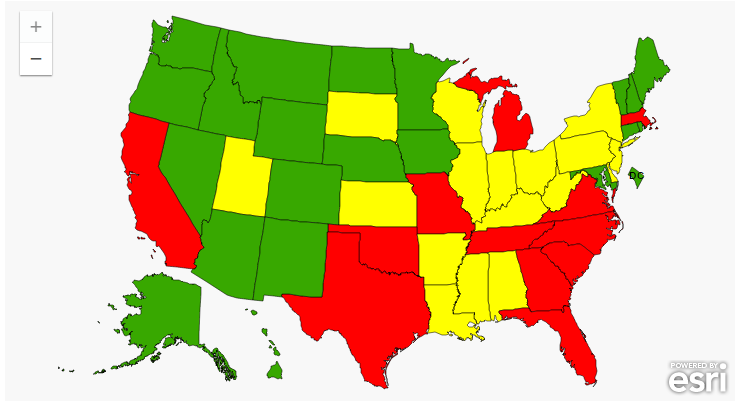 Currently, only twenty states have the full practice regulation in place; mainly those in the Pacific Northwest and Mid-west. However, with the increased pressure to decrease the associated cost of health care (as a result of the Affordable Care Act combined with the Medicare expansion), many are arguing in favor of enabling nurse practitioners to have full practice privilege.
Currently, only twenty states have the full practice regulation in place; mainly those in the Pacific Northwest and Mid-west. However, with the increased pressure to decrease the associated cost of health care (as a result of the Affordable Care Act combined with the Medicare expansion), many are arguing in favor of enabling nurse practitioners to have full practice privilege.
In several states across the United States, as indicated in the map below, nurse practitioners have "full practice authority;" represented in green. According to the American Association of Nurse Practitioners, full practice authority is defined as:
State practice and licensure law provides for all nurse practitioners to evaluate patients, diagnose, order and interpret diagnostic tests, initiate and manage treatments—including prescribe medications—under the exclusive licensure authority of the state board of nursing. This is the model recommended by the Institute of Medicine and National Council of State Boards of Nursing.
Nurse Practice Laws by State


Map provided by the American Association of Nurse Practitioners
Pennsylvania recently made news for a bill passed by the Senate and is on its way to the House call which called for the removal of “collaborative agreements” between nurses and physicians. Supporters of the bill argue that besides enabling nurse practitioners to treat more patients, passing the bill will increase quality of care; particularly in rural areas where primary care doctors are not as prevalent.
The Philadelphia Inquirer interviewed Antonia Villarruel, dean of the University of Pennsylvania School of Nurse. Villarruel argues that many nurse practitioners are already work in a collaborative practice, where they are able to independently take on additional tasks such a prescription-writing and primary-care treatment. She goes on to explain how by “removing the barrier to [the] full scope of practice,” it would effectively lower health care costs. Looking at New Jersey as an example, a state where NP’s don’t need collaborative agreement, nurse practitioner visits could become a more affordable form of service.
If this bill is passed it will enable health care staffing firms specializing in the placement of Nurse Practitioners (NP’s) in environments where there is not a Physician onsite providing medical oversite. Currently, a collaborative agreement is required and the NP is under the Physicians license. Over the last few years many restrictions have been lifted comparing NP’s to PA’s (Physicians Assistants). In my professional opinion, this will open up opportunities for the staffing industry and Nurse Practitioners as studies indicate the rising number of NP graduates over RN's.
About the Author: Lisa Flanagan is a Regional Business Development Manager with Yoh Healthcare based in Philadelphia. She has been working in the staffing industry for twenty years.




